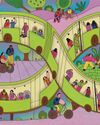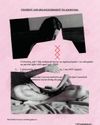
“There absolutely is an increased appetite for this work now,” says Eric Butler.
When the phone rang at 7 a.m. on a January morning in 2010, Eric Butler learned that his sister had just been murdered.
He had four sisters—“I’m the only boy in a sea of girls”—and 29-year-old Lanell was eight years younger than him. She’d also fled New Orleans after Hurricane Katrina, to Florida. There she met a man, “the most popular young guy on the block. This cat was a drug dealer. And I guess he was good at it. Because he made a lot of money. But he became controlling, really, really fast. He started to hit her. And one night she said she was going to leave him. So he beat her up pretty good. And the kids are there.” Lanell had six children. “After he beat her up and he’s in this drunken stupor, he rapes her. When he goes to bed, she sneaks out of the house. She MapQuests her way back to New Orleans.” This was before gps navigation was common, “so she had to get like a physical printout. And he wakes up and realizes that she’s gone. Looks on the computer and he can see where.”
Lanell drove her children to the home of one of her sisters. “She’s got it all planned out. She’s going to register the kids into the elementary school, which is right across the street from my sister’s apartment complex.”
هذه القصة مأخوذة من طبعة November/December 2020 من Mother Jones.
ابدأ النسخة التجريبية المجانية من Magzter GOLD لمدة 7 أيام للوصول إلى آلاف القصص المتميزة المنسقة وأكثر من 9,000 مجلة وصحيفة.
بالفعل مشترك ? تسجيل الدخول
هذه القصة مأخوذة من طبعة November/December 2020 من Mother Jones.
ابدأ النسخة التجريبية المجانية من Magzter GOLD لمدة 7 أيام للوصول إلى آلاف القصص المتميزة المنسقة وأكثر من 9,000 مجلة وصحيفة.
بالفعل مشترك? تسجيل الدخول

HOG WILD
The scandalous reason meat prices have skyrocketed

ALL WALKS
Limiting cars in cities can help disabled people, too.

REMIGRATION
How Trumpism is following the far right in Europe toward mass expulsion of immigrants

SETTLING THE SCORE
A pop psychology book is considered the definitive trauma text. But what if it's leading survivors down the wrong path?

Positive Spin
People with e-bikes drive less, pollute less, parkinglots-and that's only part of why cities and states are embracing them with gusto.

Cradle and All
The devastating cost of Utah's thriving adoption industry

THE BILLIONAIRE WHO NEARLY BROKE NEWPORT
TRUMP MEGADONOR STEPHEN SCHWARZMAN'S EXTREME MANSION MAKEOVER IS DRIVING HIS NEIGHBORS NUTS.

THE SECRET PLAN TO STRIKE DOWN US GUN LAWS
AND THE COP-TURNED-PASTOR AT THE CENTER OF IT ALL

GOOD NIGHT AND GOOD LUCK
Election Day inside a bustling broadcast newsroom that no longer exists

MASTER OF DISASTER
Trump won’t confront the climate crisis. He’ll feast off it.